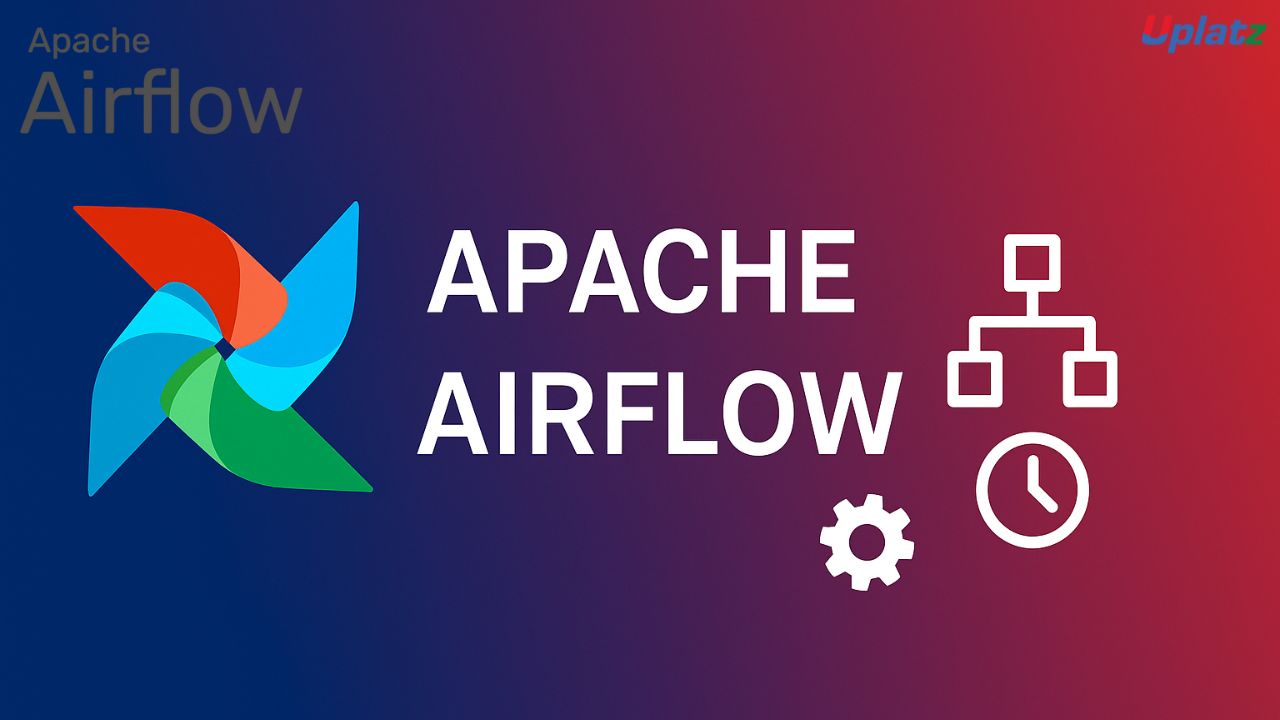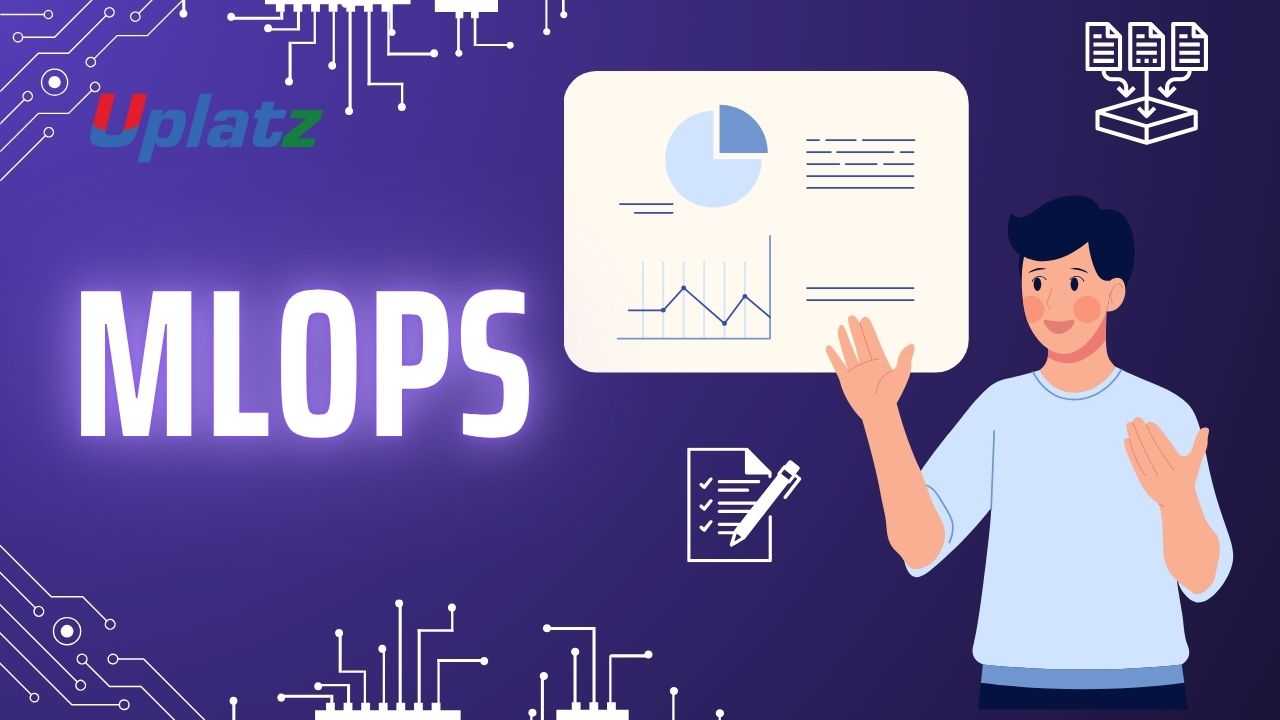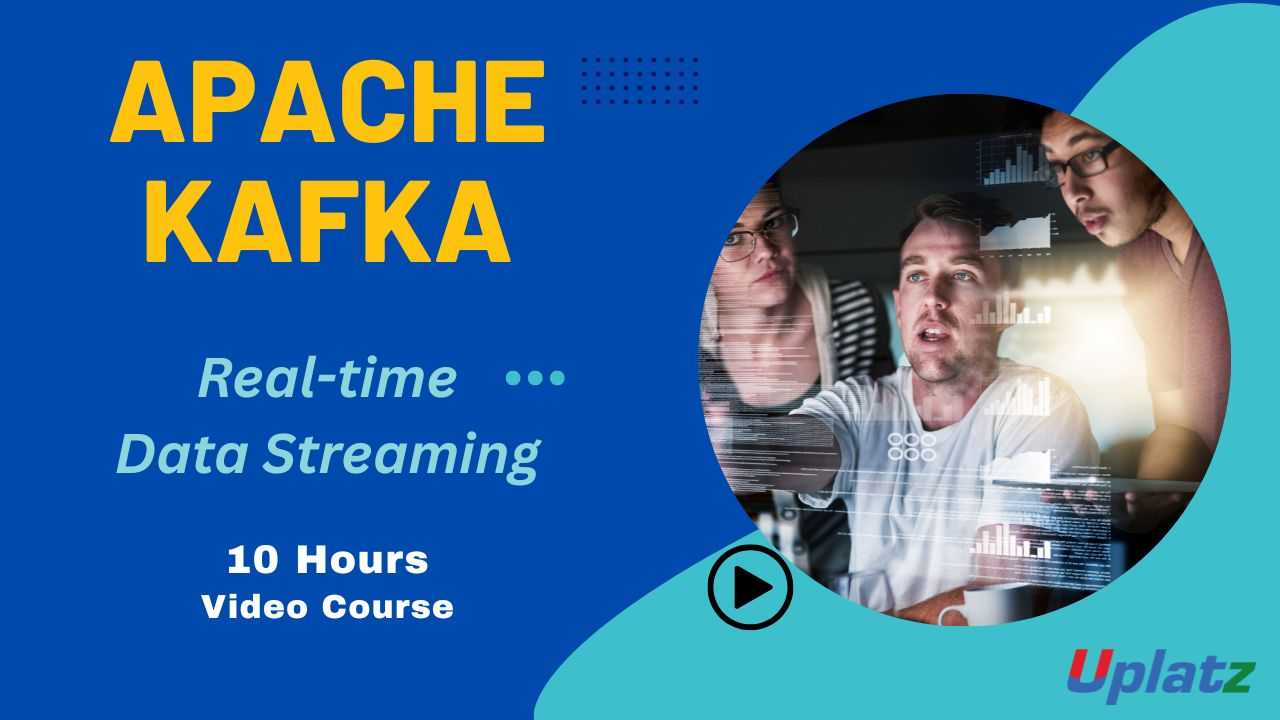Apache Airflow
Master Apache Airflow to orchestrate, schedule, and monitor data pipelines for modern data engineering and machine learning workflows. Price Match Guarantee
Full Lifetime Access
Access on any Device
Technical Support
Secure Checkout
Course Completion Certificate
Price Match Guarantee
Full Lifetime Access
Access on any Device
Technical Support
Secure Checkout
Course Completion Certificate
 97% Started a new career
BUY THIS COURSE (
97% Started a new career
BUY THIS COURSE (GBP 12 GBP 29 )-
 86% Got a pay increase and promotion
86% Got a pay increase and promotion
Students also bought -
-

- Data Engineering
- 10 Hours
- GBP 12
- 10 Learners
-

- MLOps
- 10 Hours
- GBP 12
- 10 Learners
-

- Apache Kafka
- 10 Hours
- GBP 12
- 1476 Learners

Apache Airflow is an industry-leading, open-source platform that enables engineers to programmatically author, schedule, and monitor workflows. Originally developed at Airbnb and now part of the Apache Software Foundation, Airflow has become the backbone of data engineering, DevOps, and machine learning automation across industries.
This Mastering Apache Airflow – Self-Paced Online Course by Uplatz equips you with the knowledge and hands-on skills to build, schedule, and manage complex data pipelines efficiently. From mastering DAGs (Directed Acyclic Graphs) to deploying production-grade workflows on Docker, Kubernetes, and cloud platforms, this course provides a complete, end-to-end learning experience for aspiring and practicing data professionals.
🔍 What is Apache Airflow?
Apache Airflow is a workflow orchestration tool designed to automate and monitor data pipelines. Unlike manual or script-based scheduling, Airflow allows developers to define workflows as Python code, making them easy to version, test, and maintain.
The core idea behind Airflow is that workflows are code — dynamic, modular, and scalable. Workflows are represented as DAGs (Directed Acyclic Graphs), where each node (task) defines a specific step, and dependencies between tasks determine execution order.
Airflow is built around a metadata database, scheduler, executor, and web interface, giving teams full visibility and control over the flow of data across systems.
⚙️ How Apache Airflow Works
Airflow operates through four primary components:
-
Scheduler – Decides what tasks need to run and when.
-
Executor – Distributes tasks across workers for parallel execution.
-
Webserver (UI) – Provides a user-friendly interface to monitor DAG runs, logs, and performance.
-
Metadata Database – Stores state information about DAGs, tasks, and runs.
Developers define workflows as Python scripts, combining operators (prebuilt task templates), hooks (integrations with external systems), and sensors (event-based triggers). These tasks can range from data extraction and transformation (ETL) to machine learning model training, cloud storage synchronization, and API automation.
Airflow integrates seamlessly with tools like AWS, GCP, Azure, Snowflake, Databricks, and BigQuery, making it the orchestration layer of choice in modern data ecosystems.
🏭 How Apache Airflow is Used in the Industry
Airflow has become a critical component of data infrastructure at leading technology companies and enterprises. It’s used for:
-
ETL Pipelines: Automating data extraction, transformation, and loading across distributed systems.
-
Data Analytics: Orchestrating workflows for daily, hourly, or real-time analytics.
-
Machine Learning Operations (MLOps): Managing model training, retraining, validation, and deployment workflows.
-
DevOps Automation: Handling backups, cron jobs, and CI/CD pipelines.
-
Cloud Data Platforms: Integrating with services like AWS Glue, GCP Dataflow, and Azure Data Factory.
Organizations such as Airbnb, Netflix, Lyft, Shopify, and Adobe rely on Airflow for its scalability, visibility, and resilience. Mastering it gives you an immediate advantage in data-driven environments.
🌟 Benefits of Learning Apache Airflow
Learning Apache Airflow provides a huge boost to your data engineering, ML, and DevOps skillset:
-
End-to-End Workflow Automation: Replace manual pipelines with dynamic DAG-based orchestration.
-
Scalability: Distribute workloads across multiple nodes for efficiency.
-
Observability: Monitor pipelines visually through the Airflow UI.
-
Flexibility: Write pipelines in Python — no complex configuration files.
-
Integration-Friendly: Connect to hundreds of tools via operators and hooks.
-
Production Reliability: Build fault-tolerant, recoverable, and scheduled workflows.
-
Career Growth: Airflow expertise is among the top-requested skills for data engineers, analysts, and ML professionals.
By mastering Airflow, you’ll gain the ability to design and manage automated data systems that support analytics, machine learning, and enterprise-scale operations.
📘 What You’ll Learn in This Course
This course takes you from foundational concepts to advanced orchestration techniques, helping you build production-grade pipelines confidently. You’ll learn to:
-
Understand Airflow’s architecture, scheduler, and core components.
-
Author and manage workflows using DAGs (Directed Acyclic Graphs).
-
Work with operators, sensors, hooks, and tasks for real integrations.
-
Use templating and macros for dynamic workflows.
-
Schedule and monitor pipelines through the Airflow web interface (UI).
-
Build ETL, analytics, and ML pipelines end-to-end.
-
Integrate Airflow with AWS, GCP, Azure, and databases.
-
Deploy Airflow using Docker Compose, Kubernetes, or cloud managed services.
-
Apply best practices for logging, scaling, and error handling.
-
Implement CI/CD workflows for Airflow DAG deployment.
By the end of the course, you’ll have the technical expertise to design, schedule, and operate real-world workflows used in data engineering and machine learning projects.
🧠 How to Use This Course Effectively
To maximize your learning experience:
-
Start with the Basics: Install Airflow locally and create your first simple DAG.
-
Experiment with Operators: Explore Python, Bash, and SQL operators.
-
Play with Scheduling: Configure DAG runs using cron expressions and intervals.
-
Develop Projects: Build ETL and ML pipelines with sample datasets.
-
Deploy to Production: Use Docker or Kubernetes to deploy Airflow environments.
-
Revisit Modules: Study monitoring, scaling, and optimization techniques.
-
Capstone Project: Design a fully automated data workflow from ingestion to visualization.
Consistent practice and experimentation will make you confident in managing Airflow in real production environments.
👩💻 Who Should Take This Course
This course is designed for:
-
Data Engineers building and automating data pipelines.
-
Machine Learning Engineers & Scientists orchestrating ML workflows.
-
DevOps Professionals managing automated and scheduled jobs.
-
Analytics Engineers transforming and aggregating data pipelines.
-
Students & Professionals entering the field of data engineering and workflow orchestration.
No prior experience with orchestration tools is required — the course starts from fundamentals and builds toward expert-level implementations.
🧩 Course Format and Certification
This self-paced course includes:
-
HD video lectures and live coding demonstrations.
-
Downloadable DAG templates and project examples.
-
Step-by-step assignments and hands-on labs.
-
Conceptual quizzes and checkpoints to reinforce learning.
-
Lifetime access with free updates for new Airflow versions.
Upon completion, you’ll receive a Course Completion Certificate from Uplatz, validating your expertise in workflow orchestration and data pipeline automation.
🚀 Why This Course Stands Out
-
Comprehensive Learning Path: Covers Airflow fundamentals to enterprise deployment.
-
Hands-On Projects: Reinforces learning through practical exercises.
-
Industry Focused: Designed around real-world data engineering use cases.
-
Scalable Knowledge: Teaches Docker, Kubernetes, and cloud deployment methods.
-
Career-Ready Skills: Ideal preparation for data engineering interviews and projects.
With this course, you’ll not only master the technical aspects of Airflow but also understand its strategic role in modern data infrastructure and AI systems.
🌐 Final Takeaway
In a world where data pipelines drive every analytics, AI, and DevOps process, mastering Apache Airflow is an essential skill. Its ability to orchestrate complex workflows across systems makes it a cornerstone of modern data platforms.
The Mastering Apache Airflow – Self-Paced Course by Uplatz provides everything you need to build, schedule, and monitor scalable pipelines with confidence. Whether you’re designing ETL processes, deploying ML models, or managing cloud workflows, Airflow offers the flexibility, power, and reliability to automate it all.
Enroll today to future-proof your data engineering career and master the framework that powers the world’s most advanced data ecosystems.
By completing this course, learners will:
-
Write and manage DAGs in Airflow.
-
Use operators, hooks, and sensors effectively.
-
Orchestrate ETL, ML, and data workflows.
-
Deploy Airflow in cloud and containerized environments.
-
Monitor and troubleshoot pipelines in production.
Course Syllabus
Module 1: Introduction to Airflow
-
What is Apache Airflow?
-
Airflow architecture overview
-
Airflow vs. other orchestration tools (Luigi, Prefect, Dagster)
Module 2: Getting Started
-
Installing Airflow (local, Docker, cloud)
-
Airflow CLI and UI overview
-
Creating your first DAG
Module 3: DAGs & Scheduling
-
DAG concepts and structure
-
Scheduling workflows (cron, interval)
-
Backfilling and retries
Module 4: Operators & Tasks
-
Core operators (Python, Bash, Email, etc.)
-
Custom operators
-
Sensors and hooks for integrations
Module 5: Workflow Orchestration
-
Task dependencies and branching
-
Parallelism and task concurrency
-
XComs and inter-task communication
Module 6: Data Pipelines
-
Building ETL workflows
-
Integrating with databases (Postgres, MySQL)
-
Cloud storage (S3, GCS, Azure Blob)
Module 7: Machine Learning Pipelines
-
Orchestrating ML training workflows
-
Model deployment pipelines
-
Experiment tracking with Airflow
Module 8: Deployment & Scaling
-
Airflow with Docker Compose
-
Running Airflow on Kubernetes
-
Managed Airflow on AWS, GCP, and Azure
Module 9: Monitoring & Logging
-
Airflow logs and metrics
-
Alerts and notifications
-
Debugging workflows
Module 10: Security & Governance
-
Role-based access control (RBAC)
-
Authentication and authorization
-
Compliance and audit trails
Module 11: Advanced Features
-
Dynamic DAGs
-
Plugins and extensions
-
Airflow REST API
Module 12: Real-World Projects
-
Data warehouse ETL pipeline (Snowflake/BigQuery)
-
ML training pipeline with Airflow + TensorFlow
-
Analytics pipeline with Airflow + Spark
Learners will receive a Certificate of Completion from Uplatz, validating their expertise in Apache Airflow and workflow orchestration. This certificate demonstrates readiness for roles in data engineering, ML engineering, and MLOps.
Apache Airflow skills prepare learners for roles such as:
-
Data Engineer
-
MLOps Engineer
-
Data Scientist (Pipeline Automation)
-
Cloud Data Engineer
-
Workflow Orchestration Specialist
Airflow has become the de facto standard for data pipeline orchestration, making it a must-have skill for data-driven organizations.
-
What is Apache Airflow?
An open-source tool for workflow orchestration, managing data pipelines with DAGs. -
What is a DAG in Airflow?
A Directed Acyclic Graph that defines the structure of workflows. -
What are operators in Airflow?
Pre-built classes that define specific tasks (e.g., PythonOperator, BashOperator, SQLOperator). -
How does Airflow schedule workflows?
Using cron-like expressions or presets to trigger DAG runs. -
What are sensors in Airflow?
Tasks that wait for external events before proceeding. -
What is XCom in Airflow?
A mechanism for sharing small pieces of data between tasks. -
How does Airflow scale?
By using executors like CeleryExecutor or KubernetesExecutor. -
What are Airflow use cases?
ETL, ML pipelines, cloud integration, and data warehousing. -
How do you deploy Airflow in production?
With Docker, Kubernetes, or managed services like Astronomer/Cloud Composer. -
What are common challenges in Airflow?
Scaling large DAGs, handling dependencies, and monitoring failures.









